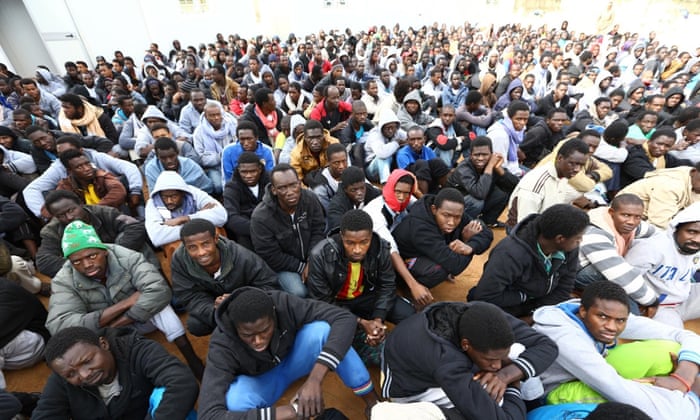Date: Mon, 11 May 2015 23:27:14 +0200
Rampant abuse by armed groups is driving refugees to risk their lives in treacherous Mediterranean crossings, says human rights group
When the 17-year-old boy, who had been locked in a house for months near Sabha in Libya, said his family in Ivory Coast could not pay for his release, his captors showed no mercy.
“They tortured us to force us to call our relatives to extort money from them. If you don’t pay, you don’t go out ... I told [the head of the ‘prison’] that I did not have any family members, that all of them had died. He answered: ‘You will join them in death if you don’t pay.’ I started crying, and so they started beating me with a belt and a broomstick,” he said.
The teenager’s story was included in an Amnesty International report documenting abductions, torture and other abuses by smugglers and armed groups in Libya. The rights group said these horrors are driving many refugees and migrants to “risk their lives in treacherous sea crossings in a desperate attempt to reach safety in Europe”.
The chilling testimonies were released as the EU struggles to tackle the growing number of people attempting to cross the Mediterranean from Libya. The European commission is due to unveil new proposals to impose migrant quotas on its members on Wednesday, while plans are also being drawn up for military attacks to target the trafficking networks.
Amnesty warned that efforts to destroy smugglers’ vessels before they are used could leave migrants and refugees trapped in a conflict zone, and it urged the EU to swiftly deploy promised rescue vessels where they are needed most, as well as to offer more resettlement places.
“Introducing measures to tackle smugglers, without providing safe alternative routes out for the people desperate to flee conflict in Libya, will not resolve the plight of migrants and refugees,” said Philip Luther, Amnesty International’s director for the Middle East and North Africa.
“Neighbouring countries, including Tunisia and Egypt, must keep their borders open to ensure anyone fleeing violence and persecution in Libya is granted safe refuge,” he said.
Amnesty carried out 70 interviews between August 2014 and March this year. As well as newly arrived migrants, Amnesty found that people from established migrant communities in Libya were seeking to flee the growing lawlessness.
The young Ivorian arrived in Sicily last June; he said the smugglers, who had helped him get into Libya in March 2014, handed a group of migrants over to an armed group, who imprisoned them in a three-storey house for months. The teenager, who was not named, said the “prison” was run by Libyans but that Ghanaians were also working there.
Mohamed, a Somali refugee interviewed in Sicily in April, said his group had entered Libya through the Sahara.
“In the desert, Libyan men were forcing, torturing us, beating us with swords, guns, stones, Kalashnikovs. They would beat us every day. They broke my finger, a friend had [a] broken arm. We couldn’t escape. My friend Mohamed tried to escape and was shot dead. Another man was hit on the head with a stone and died ... I stayed one month, then paid. My mother’s brother is in Holland; he paid,” he said.
The report said migrants and refugees faced abuses at all stages of the smuggling routes from west and east Africa towards the Libyan coast. Many were abducted and tortured to force them and their families to pay ransoms.
“Those unable to pay are often held effectively as slaves – forced to work without pay, physically assaulted and robbed. Smugglers also sometimes pass the migrants and refugees on to criminal groups once they cross the border in desert areas, or in major transit cities along the migration route, such as Sabha in the south-west or the coastal city of Ajdabiya in eastern Libya,” it said.
A Nigerian woman told Amnesty she was gang-raped when she arrived in Sabha in December 2012, after a gang of five armed robbers had abducted her and her husband.
“They took us to a far place outside the city in the desert. They tied my husband’s hands and legs to a pole and gang-raped me in front of his eyes,” she said.
Amnesty found that abuses were not confined to desert areas but continued in major cities. Ibrahim, a 25-year-old from Mali, said he was abducted in Tripoli last September. He was kept in a small, dirty room with 46 others.
“If you have 1,000 dinars ($740), they let you out. If you don’t, you stay. Often, the guards would come and slap you. I eventually had to pay to get out. It is effectively a business that they are running. They detain you so that you have to pay,” he said.
Amnesty’s researchers were also told of abuses in immigration detention centres where migrants and refugees, including children, can be held indefinitely. One woman said officials at one centre had beaten a pregnant woman to death.
Those interviewed for the report also highlighted the particular risk faced by Christians at the hands of some armed groups, such as Islamic State, which recently killed at least 49 Christians, mostly from Egypt and Ethiopia.
Charles, 30, from Nigeria, said he fled in March after being abducted and assaulted by a criminal gang in the coastal city of Zuwara.
“Sometimes young men would come to our house to steal our money. They would come with guns ... I am a Christian and that’s why the men would always come to our house and attack us,” he said.
“The international community has stood and watched as Libya has descended into chaos since the 2011 Nato military campaign ended, effectively allowing militias and armed groups to run amok,” Amnesty’s Luther said.
